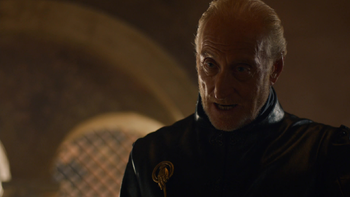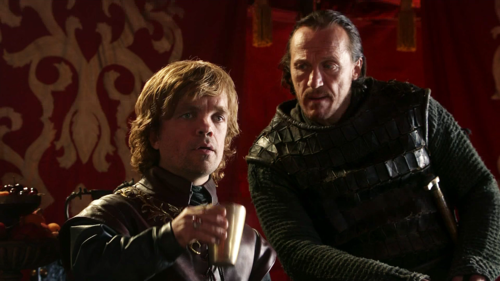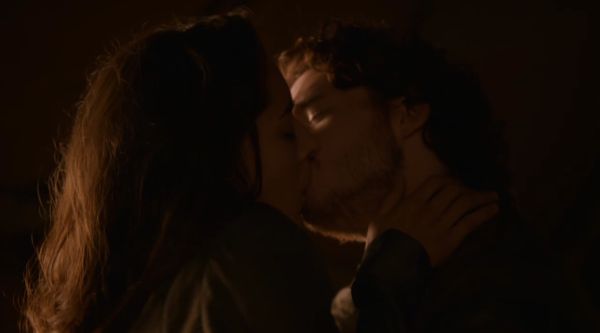This week was about irredeemable choices. Once you make that choice, you can't go back and a slew of consequences will follow including, often, death. That theme encompassed not only recent choices, such as Theon's decision to kill two children and claim that they were Bran and Rickon but also Davos Seaworth's decision to save Stannis Baratheon so many years ago during Robert's Rebellion. Everything leads up to the now and what you do now is all that you do forever.
Obviously, with the big ending of last week's episode, it made sense to start this one with the arrival of Asha/Yara at Winterfell for another good round of Chastising Theon. This week's first prize is a warning that dad is upset and that Theon's great victory is not only hollow, as we all knew, but potentially disastrous, as every man in the north will not only want Theon's head but will potentially fight the Ironborn all the harder. There is the precipice and then there is the fall. The second prize is an artfully-timed moment of actual emotion and concern from Yara for Theon's well-being. After playing nothing but the harpy since her excellent deception on the ride up to Pyke, it was both jarring and genuine to see her play the older sister for a brief moment. The best lines of the scene:
"Go on, then. Warn me."
"Don't die so far away from the sea."
speak volumes not only about Yara's genuine toughness and ease of command, but also the cultural underpinning of what it means to be from the Iron Islands and a believer in the Drowned God: they all die and their choices (as raiders and reavers) will doubtlessly lead to death, but if it's done within the bosom of the ocean, then it's a good day to die.
I was less impressed with the Lord of Bones than I'd hoped. I suppose my mental image from the books had him a bit taller and his clothes being more free-flowing. Of course, if you're standing on a glacier, free-flowing clothing is not optimal. Both scenes with Jon were fleeting, allowing only time for Ygritte to confirm her status as a free woman by retaining her prisoner for Mance and for the Halfhand to begin laying the groundwork for Jon's acclimation to the wildlings. I liked the fact that, in the second scene, where Qhorin makes a show of being angry with Jon, Rose Leslie's sly smile can be interpreted as anything from taking pleasure in Jon's dismay, to confirmation of her opinion about the Watch and the ethics of the southerners, or awareness that the Halfhand is putting on a show in order to keep Jon (and the hopes of the Watch) alive. She was, once again, a brilliant choice for the role. The best exchange of the scenes is one that will be mirrored in the last of the episode: "They died because of me." "See that it wasn't for nothing."
By far, one of the best scenes of the night (if not THE best scene) was the mother/son confrontation after Robb learns that Catelyn has set Jaime Lannister free. Choices. "Tell me this isn't true." Richard Madden continues to play to Robb's notorious restraint (evident in his attachment to Talisa but his unwillingness to acknowledge it.) Where most characters would be raging at the upheaval (betrayal, discord, loss of a strategic asset), Robb refuses to lose his cool. This was the point in the books where I began to drift away from Catelyn as a character. While her desire to see her children freed at almost any cost is absolutely understandable and her anguish leading to paying that "almost any cost" is eminently believable, I think her rash nature (you know, the thing which triggered this whole Lannister/Stark spat) began to make her more annoying than sympathetic. Michelle Fairley treads that dividing line really well here. It was a great performance by both of them. There wasn't a whole lot to dwell on in the following associated scene, with Brienne and Jaime escaping down the Trident. Jaime remains entertaining and it was nice to see Gwen Christie fold her legs properly as one would when wearing armor around the hips and legs. Having frequently sat in the similar uncomfortable position used by the samurai (for a series of iaido techniques known as chudan), my knees sympathized and I appreciated the attention to detail.
On to Harrenhal, where we find Tywin and Kevan arguing over their untenable position and Tywin unknowingly delivering an accompaniment to Robb's earlier comment to Talisa about how Eddard had told him that the only time one could be brave was when one was afraid. Tywin's observation: "He'll risk anything at any time, because he doesn't know enough to be afraid." is less true than he knows, but that's warfare for you. This is just the setup for Arya's final demand of Jaqen H'ghar, which are still some of my favorite scenes in both the books and the show. And, again, here we see the choices that will have ramifications far past what the maker can know. Maisie's matter-of-fact "A man can go kill himself." was excellent and Tom Wlaschiha's performance remains a delight as the title quote indicates. One niggling annoyance is the fact that Arya runs around asking for H'ghar. Given the subtle nature of their relationship and his activity, it struck me as a bit off that she should be so open about it. Also, I had my first glimmer of disappointment with Maisie's performance, as I expected a bit more emotion on her face while she was accosting Hot Pie, but it's possible that she was directed to continue her stonefaced approach as she had in her scenes with Charles Dance. I don't think the transformation of the still emotional young girl should happen quite so quickly, though.
Despite the excellent interplay that normally takes place between Bronn and Tyrion and, in this case, was added to by Varys, I thought the scene of Tyrion trying to prepare for a siege while Bronn annoyed him was a bit slow. Obviously, this whole episode was a step down in pacing from those previous, as we're clearly building to the crescendo that will be episode nine, but since they've already been dragging out the question of how to withstand Stannis for most of this season, one more reminder that sieges suck was really kind of unnecessary. Bronn's pragmatic approach to dealing with the inevitable issue of famine ("It's just the unknown thieves we have to worry about now."; reminiscent of Donald Rumsfeld's comment about the "known unknowns") was well played, though.
In contrast, the next two scenes in Kings Landing were fantastic. Tyrion's dinner with Cersei (the old English proverb: "He who sups with the Devil should have a long spoon." immediately sprang to mind) was their best scene yet, allowing Lena Headey to revel in her character's wickedness and tremendous insecurities while Dinklage is confronted with a perilous moment: How to control one's relief and one's dismay? Obviously, he's relieved that it's Roz and not Shae whom is brought before him. On the other hand, as one of the few characters in the game with an actual moral streak, he knows that Roz will be tortured to death if things don't proceed according to Cersei's desires. Choices. Throw it in Cersei's face that she screwed up and save Roz's life or continue to live under better cover with her already satisfied? This is, of course, compounded by the fact that it was Tyrion who called attention to Roz in the first place by sending her to Joffrey. "Your joy will turn to ashes in your mouth." is a great line unfortunately spoiled by earlier trailers for the series, but I liked Cersei's "Get. Out." even better, as it was framed by her contemptuous delight. Great, great moment. This was also the second reference to "baby brother" in this episode, with starkly different intent. Honestly, I know I've mentioned their chemistry before, but no pair could have done this scene better. There's been a great deal of criticism of Headey's portrayal of Cersei because she was supposedly "too human". But the point is that Cersei is human, with all of the failings that go with that. She's not the Wicked Queen of Snow White or some kind of Sauronish embodiment of evil. She's human (albeit a fairly amoral, petty, and vindictive one) and I think Headey's performance has been exemplary.
On the other hand, Tyrion and Varys (and Joffrey) walking the battlements was excellent largely for the dialogue and the reinforcement of tendencies we're already well aware of:
"Imagine Stannis' terror!"
"I am trying."
"I wish we could converse as two honest, intelligent men."
"I wish we could, too."
"If we're going to play, you'll have to start."
"A most highborn plumber."
"One game at a time, my friend."
Using that moment to remind everyone of their awareness of Daenerys was good timing, but Tyrion's final statement about having other things on their plate was the wisest thing actually said. Someone else who doesn't come in for accolades very often is Conleth Hill, as Varys. He's done a remarkable job with a very subtle role that requires him to both overplay it and underplay it at various times. Great stuff.
Another good moment was Weiss and Benioff's decision to finally delve into the story of the Onion Knight, Ser Davos, for the benefit of the TV-only viewers; reminding everyone of the roots of some of the current conflict by, once again, highlighting choices that were made in the past (Davos' decision to run the blockade of Storm's End and save Stannis; Robert's decision to give Renly the Baratheon seat instead of his older brother) that still have ramifications now. There's so much history in the books that the TV series really can't touch on (despite website and DVD features) that it's often nice to have these moments of people reminiscing to events like Robert's Rebellion and informing the viewers of how deeply rooted some of these conflicts are. The moment of dragonglass discovery by Sam and Co. is another of those. A long-ago Watchman buried the glass at the Fist of the First Men as a clue. It will be up to Sam and his book-learnin' to see if they can use it to their advantage.
And, of course, the scene of the night for a number of reasons.
Firstly, it's a choice that will have huge ramifications for Robb and his position in the field and on the presumed throne of the North. His betrayal of the arrangement with the Freys is a profound insult to an already vainglorious family. Secondly, it's only the second moment that Robb steps outside his carefully established boundaries (the other being him attacking the tree in anguish over Eddard's death in season 1) and fully engages what he wants, rather than what he feels obligated to do. I think they teased this just enough that it felt genuine (Roose Bolton's quick exit from the tent acknowledged the public awareness of the attraction between Robb and Talisa, even if the latter's body language wasn't screaming the message already.) Robb's line: "How did you go from reciting Valyrian poetry to sawing off men's feet?" was brilliant but actually seemed more appropriate with Bolton in the room ("At the Dreadfort, we do both!") The culmination of the scene was, without doubt, the hottest sex scene of the series to date. Why?
She left the boots on.
Put aside the fact that Oona Chaplin is already smoking hot. She left the boots on. I wonder if that was the actor's choice or the director's. I'm kinda thinking it was hers. I'm going to stop talking about this now...
The denouement with Aemon, Osha, and Bran was the final reinforcement of the theme. The two think that they're sparing Bran the distress of knowing that two boys died for him, but he's already aware and the decision to not tell him is just one more little thing that may or may not color later events. Next week is the big bash and, presumably, Dany's trip into the House of the Undying (given her two minutes of screen time this week) so "faster-paced" doesn't really begin to describe it. The episode was written by the man himself, GRRM, so here's hoping they did his script justice.







No comments:
Post a Comment
Note: Only a member of this blog may post a comment.